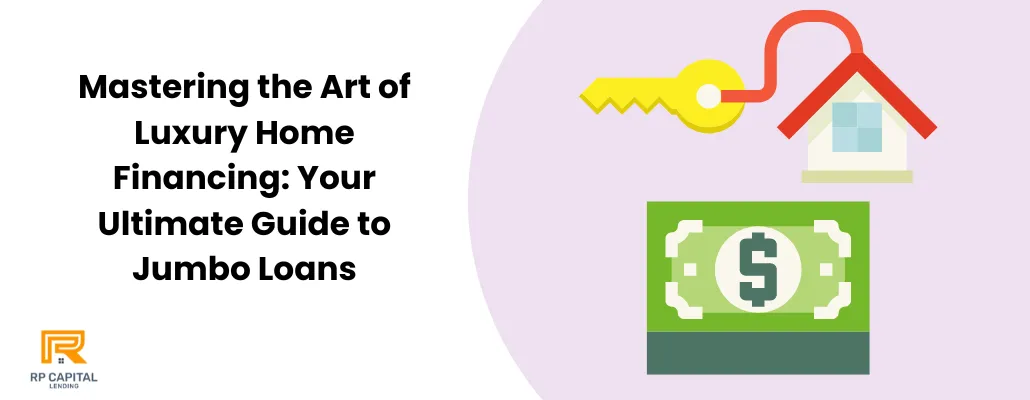Blog

Mastering the Art of Luxury Home Financing: Your Ultimate Guide to Jumbo Loans
Introduction: Your Gateway to Grandeur
Imagine stepping into a home that's not just a dwelling but a statement of your success, a mansion that echoes your achievements. Such grandeur often comes with a price tag that exceeds conventional financing options. Here lies the magic of Jumbo Loans - the key to unlocking the door to your dream mansion. But what exactly are Jumbo Loans, and how do they work? Let's embark on a journey to unravel the mysteries of financing high-value homes.
Understanding Jumbo Loans: The Basics
Jumbo Loans are a type of financing that exceeds the conforming loan limits set by Fannie Mae and Freddie Mac, the two government-sponsored enterprises that buy the majority of U.S. residential mortgages from lenders. These loans are designed for purchasing high-value properties that require larger loan amounts than what is available through conventional mortgages.
Key Features of Jumbo Loans:
Higher Loan Limits: The primary distinction of Jumbo Loans is their ability to finance properties that surpass the conforming loan limits.
Interest Rates: Interest rates on Jumbo Loans were traditionally higher than conventional loans, but the gap has narrowed in recent years.
Down Payment: Borrowers typically need to make a larger down payment, often 20% or more of the home's purchase price.
Credit Requirements: Lenders usually require a higher credit score for Jumbo Loan approval compared to conventional loan requirements.
Income and Asset Verification: Expect thorough scrutiny of your income, assets, and debt-to-income ratio.
Pros and Cons of Jumbo Loans:
Pros:
Access to higher loan amounts to finance luxury properties.
Competitive interest rates in the current market.
Variety in loan terms and structures.
Cons:
Stricter qualification criteria.
Larger down payments required.
Potentially higher interest rates compared to smaller, conventional loans.
Navigating the Application Process
Securing a Jumbo Loan involves a meticulous application process, designed to ensure that borrowers are financially stable enough to handle larger loans. Here's what you can expect:
Credit Score Assessment: A high credit score is crucial. Aim for a score above 700, though the exact requirement can vary by lender.
Proof of Income and Assets: Be prepared to provide detailed documentation of your income, investments, and assets.
Appraisal: High-value homes often require a more detailed appraisal process to confirm their market value.
Debt-to-Income Ratio (DTI): Your DTI should ideally be lower than 43%. This shows lenders you can manage your current debt and take on more.
The Path to Approval: Strengthening Your Application
The journey to securing a Jumbo Loan is marked by stringent lending criteria. However, understanding what lenders look for can help you position yourself as a prime candidate for approval.
Building a Robust Financial Profile
Beyond the basics of credit scores and down payments, lenders will delve into your financial history, liquidity, and the stability of your income. Demonstrating a strong financial profile includes having significant reserves or assets beyond the down payment and closing costs.
Dealing with Debt Wisely
Your approach to existing debt and your debt-to-income ratio can significantly impact your loan application. Lenders prefer borrowers who manage their debt judiciously, showing a history of on-time payments and the ability to balance debt with income.
Tips for Prospective Borrowers
Improve Your Credit Score: A higher credit score not only helps in getting your loan approved but can also secure you a better interest rate.
Save for a Larger Down Payment: The more you can put down, the better your loan terms can be.
Shop Around: Don't settle for the first offer. Compare lenders to find the best rates and terms for your situation.
Consider Your Long-Term Financial Health: Make sure you can comfortably manage the loan payments along with your other financial obligations.
FAQs on Jumbo Loans
Q1: Can I get a Jumbo Loan with a 10% down payment?
While most lenders require a 20% down payment for Jumbo Loans, some may offer loans with a 10% down payment to highly qualified borrowers.
Q2: Are Jumbo Loan interest rates much higher than conventional loans?
The interest rates on Jumbo Loans have become more competitive, and in some cases, they are comparable to or even lower than conventional loan rates.
Q3: Is mortgage insurance required for Jumbo Loans?
Typically, Jumbo Loans do not require private mortgage insurance (PMI), even with down payments less than 20%, but this can vary by lender.
Q4: What is the maximum loan amount I can get with a Jumbo Loan?
The maximum loan amount varies by lender and your financial qualifications but can go into the millions.
Q5: How long does it take to close a Jumbo Loan?
The closing process for a Jumbo Loan can be longer than conventional loans, often taking 45 days or more, due to the detailed underwriting process.
Conclusion: Stepping Into Your High-Value Home
Navigating the world of Jumbo Loans can initially seem daunting. However, with the right preparation and understanding, securing a loan for your high-value home becomes an attainable dream. Remember, these loans open the door to properties that reflect your achievements and aspirations. By carefully considering your options and preparing meticulously, you can step into the mansion that you've always envisioned as your home.
Jumbo Loans are not just about financing; they're about making a statement with your home. With this comprehensive guide, you're now equipped to take the first steps towards securing your dream mansion. Remember, the key to success lies in detailed preparation and strategic planning. Happy house hunting!
Disclaimer: Loans only apply to non-owner occupied properties. Rates, terms and conditions offered only to qualified borrowers, may vary upon loan product, deal structure, other applicable considerations, and are subject to change at any time without notice.
Copyright © 2025. All Rights Reserved.


